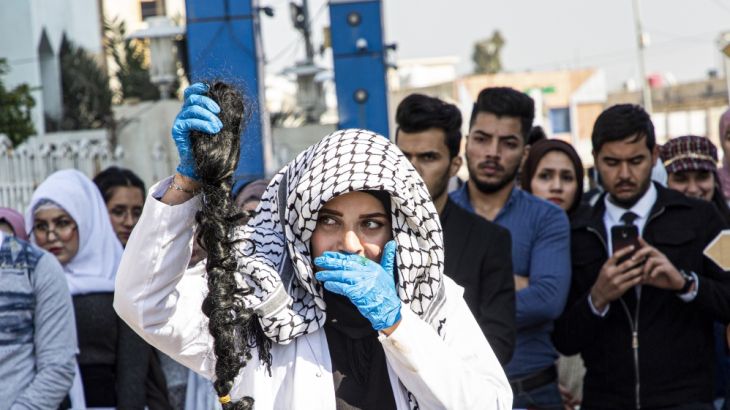Iraq protests swell with people angry at slow pace of reforms
Rallies demanding overhaul of the ruling system rock capital Baghdad and Shia-majority parts of southern Iraq.

Iraqis angry at the government’s slow pace of reforms have ramped up their protests, sealing the streets of capital Baghdad with burning tyres and threatening further escalation unless their demands are met.
Protesters on Sunday blocked roads in Iraq‘s capital and in the holy city of Najaf a day before their deadline to the government on making progress on reform pledges expires.
Keep reading
list of 2 itemsIraq protests: Taking on the establishment, fighting to be heard
Fearing Iraq would be caught in the middle of the geopolitical storm amid rising Iran-US tensions following the assassination of Iranian general Qassem Soleimani, the Iraqi protesters last Monday gave the government one week to announce its reform measures.
More:
A leaderless uprising erupted in Iraq on October 1, with thousands taking to the streets in Baghdad and the predominantly Shia southern Iraq, decrying corruption, poor services, lack of jobs and calling for an end to the political system that was imposed after the 2003 invasion by the United States.
‘Cripple Iraq’s roads’
Hundreds of angry youths descended on the main protest camp in Baghdad’s Tahrir Square as well as nearby Tayaran Square on Sunday, burning tyres to block highways and bridges and turning back cars and causing traffic jams across the city.
Reporting from Babylon, Al Jazeera’s Imran Khan said the protesters were preparing to “cripple Iraq’s roads”.
“The protesters say they will cut off south of Iraq from the rest of the country by blocking all the main roads,” he said. “The reason is simple: they say their demands for a new prime minister and new elections have not been met.”
Jassim Abbas, a protester, told Al Jazeera they want “rapid elections and an independent candidate who doesn’t belong to the old parties”.
“If not, we will escalate and block the highway and all the entrances of the city and kick out the corrupt officials,” another protester Abdul Hamza Khaffaji told Al Jazeera.
At least 10 people including police officers were wounded when security forces tried to clear the sit-ins with tear gas and protesters responded by throwing rocks, medical and security sources told AFP news agency.
Rallies also swelled in the cities of Kut, Diwaniyah and Amara, where most government offices, schools and universities have been shuttered for months.
In the holy city of Najaf, youth wrapped in chequered black-and-white scarves and carrying Iraqi flags lit tyres and began a sit-in on a main road leading to the capital.
Further the south in the oil-rich port city of Basra, students gathered in an ongoing strike in support of the rallies elsewhere.
‘Deadline ends tonight’
Protesters are demanding early elections based on a reformed voting law, a new prime minister to replace current caretaker premier Adel Abdul Mahdi and that officials deemed corrupt be held to account.
Abdul Mahdi resigned nearly two months ago, but political parties so far have failed to agree on a successor and he has continued to run the government as a caretaker.
Demonstrators have publicly rejected the names circulating as possible replacements and are furious that other sweeping reform measures have not been implemented.
“We began to escalate today because the government did not respond to our demands, notably forming an independent government that could save Iraq,” said Haydar Kadhim, a demonstrator in the southern protest hotspot of Nasiriya.
“Last Monday, we gave them a deadline of seven days. That deadline ends tonight,” Kadhim told AFP.
A fellow protester, 20-year-old university student Mohammad Kareem, said more escalation could come. “We gave the government a timeframe to implement our demands, but it looks like it doesn’t care one bit,” he said.
Al Jazeera’s Imran Khan said the protest faces a decisive moment in the coming days. “They need to put enough pressure on the government so it meets their demands,” he said.
The protests are the largest and bloodiest grassroots movement in Iraq in decades, with nearly 460 people dead and more than 25,000 wounded since October.